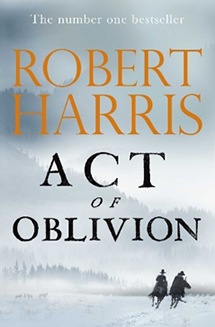Reviewed by Robert Goodman.
By Robert Harris, Penguin.
 Robert Harris is one of the pre-eminent writers of historical fiction. Not only are his books meticulously researched but he manages to draw readers in with vivid characters and universal themes. He has done plenty of World War 2 (Enigma, Munich, V2), the Cicero trilogy set in imperial Rome and a stunning exploration of the Dreyfus Affair (An Officer and a Spy). In Act of Oblivion Harris turns his attention to the English Civil War and its aftermath. But in doing so, Harris manages to take in a number of key events and movements in British and American history in the late Seventeenth Century.
Robert Harris is one of the pre-eminent writers of historical fiction. Not only are his books meticulously researched but he manages to draw readers in with vivid characters and universal themes. He has done plenty of World War 2 (Enigma, Munich, V2), the Cicero trilogy set in imperial Rome and a stunning exploration of the Dreyfus Affair (An Officer and a Spy). In Act of Oblivion Harris turns his attention to the English Civil War and its aftermath. But in doing so, Harris manages to take in a number of key events and movements in British and American history in the late Seventeenth Century.
Colonel Edward Whalley and his son-in-law Colonel William Goffe are on the run and find themselves in Boston. They were significant figures in Oliver Cromwell’s army (Whalley was also Cromwell’s cousin) and had been two of the names on the indictment that led to the execution of King Charles I. Now that the monarchy has been re-established, in order to bring some order to the realm, parliament has passed the Act of Oblivion. This law forgives all of those involved in the civil war on Cromwell’s side with the exception of those named on the execution order. Richard Nayler, a man who suffered significant loss during Cromwell’s reign, is fanatically pursuing the men who signed the order and ensuring that they are brought to trial and executed. As the list starts to diminish he turns his attention to Whalley and Goffe, who receive some protection from the American Puritans. And so begins a decades long vendetta, one that will lead to the British seizure of New Amsterdam and a war with the Dutch, the establishment of American colonies, and bear witness to an escalation of the American frontier wars, a resurgence of the Black Death and the Great Fire of London.
Act of Oblivion is not always an easy read – there is plenty of violence and death – but this is the Seventeenth Century and to pull away from that would not serve the reader. Because Harris does give a window into the era – the hardscrabble life on the American frontier, the unyielding nature of puritan belief, the politicking of the court of Charles II and life on the streets of London. Despite its decades-long timeframe, Act of Oblivion is almost constantly tense – this is the story of two men who were being pursued for years and that pursuit is relentless, taking readers all the way up to the final pages.
Similarly, the main characters are not necessarily likeable. But Harris makes sure that readers understand them and their motivations. Through Whalley and his reminiscences, Harris also takes the reader into the life and exploits of Cromwell and the events leading up to the execution of Charles I.
In Act of Oblivion Harris shows once again his mastery of the historical novel. He effortlessly delivers a fascinating place and time without laboured exposition but rather through the actions of flawed characters and a propulsive plot that retains its tension over years of pursuit.
Over 850 more book reviews can be found on Pile by the Bed.











